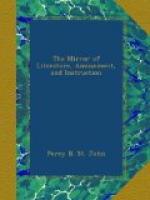“His noble and exquisitely beautiful countenance, the tone of his voice, his manners, the thousand enchantments that surrounded him, rendered him so different and so superior a being to any whom I had hitherto seen, that it was impossible he should not have left the most profound impression upon me. From that evening, during the whole of my subsequent stay at Venice, we met every day.”
* * * * *
About the middle of April, Madame Guiccioli had been obliged to quit Venice with her husband. Having several houses on the road from Venice to Ravenna, it was his habit to stop at these mansions, one after the other, in his journeys between the two cities; and from all these places the enamoured young Countess now wrote to her lover, expressing, in the most passionate and pathetic terms, her despair at leaving him. So utterly, indeed, did this feeling overpower her, that three times, in the course of her first day’s journey, she was seized with fainting-fits. In one of her letters, which I saw when at Venice, dated, if I recollect right, from “Ca Zen, Cavanella di Po,” she tells him that the solitude of this place, which she had before found irksome, was, now that one sole idea occupied her mind, become dear and welcome to her, and promises that, as soon as she arrives at Ravenna, “she will, according to his wish, avoid all general society, and devote herself to reading, music, domestic occupations, riding on horseback,—every thing, in short, that she knew he would most like.” What a change for a young and simple girl, who, but a few weeks before, had thought only of society and the world, but who now saw no other happiness but in the hope of becoming worthy, by seclusion and self-instruction, of the illustrious object of her love!
On leaving this place, she was attacked with a dangerous illness on the road, and arrived half dead at Ravenna; nor was it found possible to revive or comfort her till an assurance was received from Lord Byron, expressed with all the fervour of real passion, that, in the course of the ensuing month, he would pay her a visit. Symptoms of consumption, brought on by her state of mind, had already shown themselves; and, in addition to the pain which this separation had caused her, she was also suffering much grief from the loss of her mother, who, at this time, died in giving birth to her twentieth child. Towards the latter end of May she wrote to acquaint Lord Byron that, having prepared all her relatives and friends to expect him, he might now, she thought, venture to make his appearance at Ravenna. Though, on the lady’s account, hesitating as to the prudence of such a step, he, in obedience to her wishes, on the 2nd of June, set out from La Mira (at which place he had again taken a villa for the summer), and proceeded towards Romagna.




